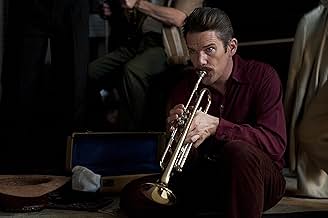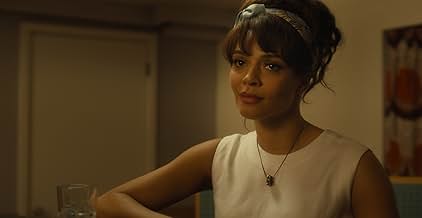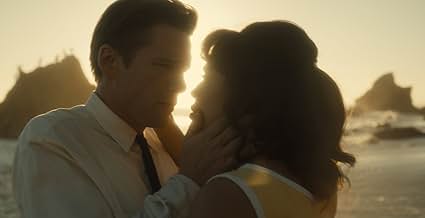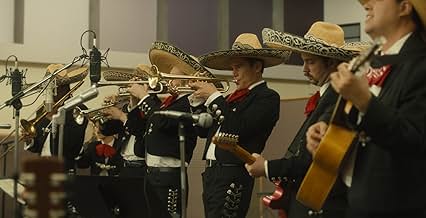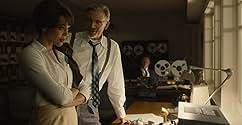IMDb RATING
6.8/10
9.5K
YOUR RATING
A re-imagining of jazz legend Chet Baker's musical comeback in the late '60s.A re-imagining of jazz legend Chet Baker's musical comeback in the late '60s.A re-imagining of jazz legend Chet Baker's musical comeback in the late '60s.
- Director
- Writers
- Stars
- Awards
- 4 wins & 8 nominations total
- Director
- Writers
- All cast & crew
- Production, box office & more at IMDbPro
Featured reviews
"Born To Be Blue" (2015 release; 97 min.) is a movie about jazz legend Chet Baker. As the film opens, we are in "Lucca, Italy, 1966" and baker is in prison, only to be bailed out by a Hollywood director. When then go to "Birdland, New York City, 1954" when Baker is at the peak of his fame and fortune, only to be exposed to heroin by a femme fatale. As it turns out, we then understand that this entire sequence was reenacted back in "Los Angeles, 1966" with Baker, now on the com-back trail, starring in his own movie. Alas, misfortune strikes again, as Baker is viciously assaulted, to such a degree that he cannot play the trumpet anymore. Now he faces even longer odds to come back. At this point we are 15 min. into the movie but to tell you more would spoil your viewing experience, you'll just have to see for yourself how it all plays out.
Couple of comments: the movie does not tell us that this is a "true story" or "inspired by true events", and for good reason, as this is NOT a bio-pic in any way, shape or form about Chet Baker. Instead, the movie brings a fictionalized composite of certain elements and episodes of Baker's life. Canadian writer-director Robert Budreau makes this into his own cocktail mix, and the end result is quite good, and certainly entertaining. That said, the movie would not have succeeded if it weren't for the outstanding performance by Ethan Hawke as Chet Baker, I mean, Hawke nails it. Kudos also to Carmen Ejogo as Baker's love interest Jane (who is African-American). There are a number of key scenes in the movie. One that stands out for me is when Baker and Jane visit Baker's parents in Oklahoma. At one point, the less than friendly (and outright racist) Baker's dad sneers "I never dragged the Baker name through the mud", to which a stunned Baker has no reply, and simply walks away (and leaves for good), wow. If there is one criticism of the movie, I felt that the music was not given a full enough role. There are long stretches in the film where music seems to be an afterthought. Given Baker's fierce love for music, music should never be an afterthought when looking at Baker's life.
"Born To Be Blue" premiered to great acclaim at the 2015 Toronto International Film Festival, but despite that only got a very limited theater release in the US (it never made it to my local art-house theater here in Cincinnati). So glad I finally picked this up as a DVD. A comparison between this movie and last year's "Miles Ahead" (about jazz legend Miles Davis) is inevitable. I found both movies are quite well done, each in their own way. If you liked "Miles Ahead", you are bound to also like "Born To Be Blue", and vice versa. Bottom line: "Born to be Blue" is worth checking out, be it on Amazon Instant Video or on DVD/Blu-ray.
Couple of comments: the movie does not tell us that this is a "true story" or "inspired by true events", and for good reason, as this is NOT a bio-pic in any way, shape or form about Chet Baker. Instead, the movie brings a fictionalized composite of certain elements and episodes of Baker's life. Canadian writer-director Robert Budreau makes this into his own cocktail mix, and the end result is quite good, and certainly entertaining. That said, the movie would not have succeeded if it weren't for the outstanding performance by Ethan Hawke as Chet Baker, I mean, Hawke nails it. Kudos also to Carmen Ejogo as Baker's love interest Jane (who is African-American). There are a number of key scenes in the movie. One that stands out for me is when Baker and Jane visit Baker's parents in Oklahoma. At one point, the less than friendly (and outright racist) Baker's dad sneers "I never dragged the Baker name through the mud", to which a stunned Baker has no reply, and simply walks away (and leaves for good), wow. If there is one criticism of the movie, I felt that the music was not given a full enough role. There are long stretches in the film where music seems to be an afterthought. Given Baker's fierce love for music, music should never be an afterthought when looking at Baker's life.
"Born To Be Blue" premiered to great acclaim at the 2015 Toronto International Film Festival, but despite that only got a very limited theater release in the US (it never made it to my local art-house theater here in Cincinnati). So glad I finally picked this up as a DVD. A comparison between this movie and last year's "Miles Ahead" (about jazz legend Miles Davis) is inevitable. I found both movies are quite well done, each in their own way. If you liked "Miles Ahead", you are bound to also like "Born To Be Blue", and vice versa. Bottom line: "Born to be Blue" is worth checking out, be it on Amazon Instant Video or on DVD/Blu-ray.
I wouldn't go as far as to say that Ethan Hawke was "born" to play Chet Baker (no pun intended to the title), but this is the kind of performance that tends to be talked about for years to come. There's no front put up between him and the audience, and despite the vocal change to be a little more hoarse or whispery or however it was that Baker was naturally from his Oklahoma-cum-cigarette-strewn roots, it feels as if Hawke has slipped into Baker's shoes from the outset and that he just IS him. And though it's mostly set in the time period where Baker bottomed out the hardest - getting his teeth knocked out by a dealer while shooting a movie featuring himself as his own character in the 'Chet Baker Story - with those scenes from the movie in the movie (whether they were filmed or just imagined by Baker from the script written for him) Hawke gets to play multiple time periods and not in a typical bio-pic format.
As an actor he gets to have such a complex, vulnerable person to slip into, and at first I wasn't sure how he would do. I think Hawke's a terrific actor, though a lot of the time it seems as if it's just Hawke as... Ethan Hawke on screen, with some exceptions (like Gattaca), and even in the 'Before' films it seems just like it's this cool guy getting in front of the camera. It seems like a lot to keep harping on the lead performance like it means everything but in this case it kind of does - there's no Giamatti or Elizabeth Banks like in last year's Love & Mercy, and also the filmmaker behind this, Robert Budreau, is not making filming it quite like the standard bio-pic: long takes where the actor (also co-star Carmen Ejogo for most of it) has to keep our attention while playing a famous musician who was not someone with a presence off-stage that was immediately compelling.
There's a lot to dig in to here thematically, whether it's drugs or race (Baker being the 'white boy' among the black giants like Miles Davis and Dizzy Gillespie, the former doesn't take too kindly to Baker in the 50's prime by the way), but while watching the movie you don't need to think about that. It's simply about this man who has his own way of going about things, is gentle in his way, and yet there's an intensity, bordering on a rage, that makes him compelling. Is it about addiction as much as the Eastwood Charlie Parker movie (Bird)? Yes and no - yes in that it's always there, as it is for all addicts, and when a scene like after he plays a show at the local bar (where he's trying to rebuild his trumpet playing skills) and a 'fan' slips him some dope (to which he responds "I thought you were a nice girl"), it seems hard not to sort of feel sorry for Baker that he's in a world where it's almost expected, in a way, for the Jazz heroes to be stone-cold junkies.
But no in that it's primarily a love story, which is where the chemistry between Hawke and Ejogo is especially crucial and, in this case, kind of strange and awesome in the approach. Many times you simply see a famous musician or actor or whoever in a movie meet a girl and fall in love and they have the ups and downs (Ray and Walk the Line are little else if not that), but here the twist is that Baker meets his love interest as she is playing his *former* lover in the movie-that-didn't-finish in the 1950's. It's a meta touch, but it's not to the point where the director takes us out of the film to any annoying degree; it's cleverly done in the opening 10/15 minutes where we think, the audience trained on clichés of biopics, that we're seeing a black-and-white flashback of this jazz-man's story of playing in Birdland and doing such things as the "first time" on heroin with some local girl.
The trick is that Baker is always Baker, whether it's in the 'real life' of the movie or the movie within the movie, it's all a movie, after all! It helps that the music is wonderful, and that's not something that is incidental; I have no idea if Hawke is playing the trumpet (he likely isn't, a handful of actors play their own stuff, let alone well, in these movies), but he does have to sing, and it's remarkable work on songs that require a thin line to walk on. Baker wasn't that phenomenal a singer except in the aspect of ripping-off-skin-to-see-the-insides honesty. It hurts to see Baker sing, and to see Hawke sing as him, and all the more that they're tender love songs. It doesn't necessarily come right away either, as the first passion for this man was the trumpet. Whether he comes to it by himself is something the movie leaves out (though I could surmise it was organic), but the point is that by the time the last third comes we've seen this man live a real life, which is all that Miles Davis asked for anyway.
A sincere, heart-breaking and simultaneously uplifting movie that is just a drama about a man working his art (among the giants always in his mind or in front of him), and a true-life story second. That it involves one of the coolest of his form is a bonus, and with an actor delivering a career-highlight work as well.
As an actor he gets to have such a complex, vulnerable person to slip into, and at first I wasn't sure how he would do. I think Hawke's a terrific actor, though a lot of the time it seems as if it's just Hawke as... Ethan Hawke on screen, with some exceptions (like Gattaca), and even in the 'Before' films it seems just like it's this cool guy getting in front of the camera. It seems like a lot to keep harping on the lead performance like it means everything but in this case it kind of does - there's no Giamatti or Elizabeth Banks like in last year's Love & Mercy, and also the filmmaker behind this, Robert Budreau, is not making filming it quite like the standard bio-pic: long takes where the actor (also co-star Carmen Ejogo for most of it) has to keep our attention while playing a famous musician who was not someone with a presence off-stage that was immediately compelling.
There's a lot to dig in to here thematically, whether it's drugs or race (Baker being the 'white boy' among the black giants like Miles Davis and Dizzy Gillespie, the former doesn't take too kindly to Baker in the 50's prime by the way), but while watching the movie you don't need to think about that. It's simply about this man who has his own way of going about things, is gentle in his way, and yet there's an intensity, bordering on a rage, that makes him compelling. Is it about addiction as much as the Eastwood Charlie Parker movie (Bird)? Yes and no - yes in that it's always there, as it is for all addicts, and when a scene like after he plays a show at the local bar (where he's trying to rebuild his trumpet playing skills) and a 'fan' slips him some dope (to which he responds "I thought you were a nice girl"), it seems hard not to sort of feel sorry for Baker that he's in a world where it's almost expected, in a way, for the Jazz heroes to be stone-cold junkies.
But no in that it's primarily a love story, which is where the chemistry between Hawke and Ejogo is especially crucial and, in this case, kind of strange and awesome in the approach. Many times you simply see a famous musician or actor or whoever in a movie meet a girl and fall in love and they have the ups and downs (Ray and Walk the Line are little else if not that), but here the twist is that Baker meets his love interest as she is playing his *former* lover in the movie-that-didn't-finish in the 1950's. It's a meta touch, but it's not to the point where the director takes us out of the film to any annoying degree; it's cleverly done in the opening 10/15 minutes where we think, the audience trained on clichés of biopics, that we're seeing a black-and-white flashback of this jazz-man's story of playing in Birdland and doing such things as the "first time" on heroin with some local girl.
The trick is that Baker is always Baker, whether it's in the 'real life' of the movie or the movie within the movie, it's all a movie, after all! It helps that the music is wonderful, and that's not something that is incidental; I have no idea if Hawke is playing the trumpet (he likely isn't, a handful of actors play their own stuff, let alone well, in these movies), but he does have to sing, and it's remarkable work on songs that require a thin line to walk on. Baker wasn't that phenomenal a singer except in the aspect of ripping-off-skin-to-see-the-insides honesty. It hurts to see Baker sing, and to see Hawke sing as him, and all the more that they're tender love songs. It doesn't necessarily come right away either, as the first passion for this man was the trumpet. Whether he comes to it by himself is something the movie leaves out (though I could surmise it was organic), but the point is that by the time the last third comes we've seen this man live a real life, which is all that Miles Davis asked for anyway.
A sincere, heart-breaking and simultaneously uplifting movie that is just a drama about a man working his art (among the giants always in his mind or in front of him), and a true-life story second. That it involves one of the coolest of his form is a bonus, and with an actor delivering a career-highlight work as well.
Ethan Hawke stars in this beautifully acted portrayal of jazz trumpeter and singer Chet Baker during his prime. Know that the film treats the facts of Baker's actual biography, as one reviewer said, more like a chord chart than a score and riffs from there. What is true-to-life is that Baker was an only child, born on a lonely ranch in Yale, Oklahoma, and went on to have numerous relationships with women and a long-term relationship with heroin. Musically, he was a progenitor of West Coast Swing, but always had his eye on the New York scene, with the mantra: "Look out Dizzy, look out, Miles. There's a little white California boy coming for you." An accident when Baker was 12 caused him to lose a front tooth, after which he had to re-learn to play the trumpet. That was a mere warmup to the effort he had to put in after his drug dealer pistol-whipped him and knocked out all of his front teeth, destroying his embouchure. Yet, he couldn't stay away from heroin. He thought it made his playing better, and he was all about his music. While Baker had a great talent for improvisation and sustaining a melodic line, he had no talent at all for being happy. After one important comeback milestone, his manager (Callum Keith Rennie) asks, "Would you try to be happy for more than ten seconds?" This line provides the ironic overlay to the choice of title for the film, one of Baker's big hits. Hawke did the films vocals; the trumpet playing was by Canadian trumpeter Kevin Turcotte. Written and directed by Robert Budreau, the movie has an opening scene that shows how a girl he picked up after a performance casually introduced him to heroin, and he didn't say no. This scene turns out to be part of a movie being made about him and whether such a significant life event happened in such an offhand way, we don't know. The insertion of black and white scenes, some of which may be from the movie (which was never finished) or from his memory, plays with the order of events, especially early in the film, an improvisational approach to history that mimics jazz music itself. Although Baker does get clean for a several years as he is recovering his playing ability, a return to heroin remains a risk in the music business. As his parole officer says, "You go into a barber shop and sit in the chair long enough, you're going to get a haircut." Still, his parole officer, his girlfriend—the delectable Carmen Ejogo (playing a composite of several women)—his manager, and many musicians wanted him to succeed, including Dizzie Gillespie and Gerry Mulligan. Miles Davis, notoriously prickly, was not a fan, and we'll get a chance to get his side of the story in the biopic with Don Cheadle, coming soon.
This movie is a fictional reconstruction of a short period in the life of Baker, during the 60s. Starting with Chet in an Italian jail in 1966, the story quickly moves to New York, where Chet is invited to play himself in a documentary about his life. Then follows one of the most amazing scenes I ever saw.
Opening as a black & white flashback, we see a young Chet in 1954, playing very cool in Birdland, with Miles Davis and Dizzie Gillespie in the audience. In the backstage we see what should be Baker's initiation to heroin, but we discover that the scene is actually part of the documentary.
Brilliant film-making is made of such scenes conveying all the magic of cinema.
The story continues with Chet trying to rebuild his "career" with a help of a female artist, unfortunate enough to be attracted by his relatively good looks and melancholic charm. The pair moves from New York to California, where Chet swear to be clean and ready to play some serious jazz.
Unfortunately, Chet was the master of all junkies, unreliable, selfish and self-destructive. His girlfriend wisely dumps him and off he goes to enjoy the company of heroin until the day he died.
I am not a jazz fan and never heard any of the music Baker played, so I cannot comment about the remarks about the music not being good enough or even detrimental to the movie. For me it was a very well written and executed film, with a solid plot and good performances.
PS: as far as "blackening the reputation" of Baker... I never understood why junkie musicians should be idolized. The history of contemporary music is paved with unpleasant, self-destructive characters who had exceptional musical skills. Egotism does not make them any less talented, but certainly does not add to their charm.
If you want to see what years of heroin addiction do to the body, just check the photos of Chet from his early 20s until the end of his life. The crevasses on his face mirrors the destruction of his internal organs....
Opening as a black & white flashback, we see a young Chet in 1954, playing very cool in Birdland, with Miles Davis and Dizzie Gillespie in the audience. In the backstage we see what should be Baker's initiation to heroin, but we discover that the scene is actually part of the documentary.
Brilliant film-making is made of such scenes conveying all the magic of cinema.
The story continues with Chet trying to rebuild his "career" with a help of a female artist, unfortunate enough to be attracted by his relatively good looks and melancholic charm. The pair moves from New York to California, where Chet swear to be clean and ready to play some serious jazz.
Unfortunately, Chet was the master of all junkies, unreliable, selfish and self-destructive. His girlfriend wisely dumps him and off he goes to enjoy the company of heroin until the day he died.
I am not a jazz fan and never heard any of the music Baker played, so I cannot comment about the remarks about the music not being good enough or even detrimental to the movie. For me it was a very well written and executed film, with a solid plot and good performances.
PS: as far as "blackening the reputation" of Baker... I never understood why junkie musicians should be idolized. The history of contemporary music is paved with unpleasant, self-destructive characters who had exceptional musical skills. Egotism does not make them any less talented, but certainly does not add to their charm.
If you want to see what years of heroin addiction do to the body, just check the photos of Chet from his early 20s until the end of his life. The crevasses on his face mirrors the destruction of his internal organs....
Jazz trumpeter Chet Baker (Ethan Hawke) gains early fame for his West Coast Swing. Miles Davis dismisses him as White Men's Hope. Drug addiction breaks up his marriage to Elaine (Carmen Ejogo). Years later, he is struggling. He meets actress Jane (Carmen Ejogo) who is playing Elaine in his movie. His drug dealer smashes his face for not paying. He loses the movie and his ability to play. Even his producer friend Dick Bock (Callum Keith Rennie) has had enough. With Jane's help, he lives in a van and slowly regains his trumpet playing.
The flow is idiosyncratic like jazz. I also would like more of his early drug addiction downfall. There are some good character work from Ethan Hawke. There isn't a overriding drama but it has good some personal moments. This is solid work from Hawke but the movie is a bit slow as a whole.
The flow is idiosyncratic like jazz. I also would like more of his early drug addiction downfall. There are some good character work from Ethan Hawke. There isn't a overriding drama but it has good some personal moments. This is solid work from Hawke but the movie is a bit slow as a whole.
Storyline
Did you know
- TriviaAccording to Ethan Hawke on the 'WTF Podcast', he wanted to play Chet Baker going back 15 to 20 years before. Richard Linklater, when approached with Hawke by the idea of a biopic, had his own idea of making a Baker film about a day-in-the-life story about the day before Baker tried heroin for the first time. But because the project couldn't gain traction, and Hawke's age not matching up after years of effort of finding a distributor, the idea was dropped.
- GoofsJane holds a stick figure made of vegetables on the set that disappears and reappears between shots.
- Quotes
Chet Baker: Time gets wider, you know. Not just longer.
- SoundtracksLet's Get Lost
Arranged and Performed by David Braid
Written by Frank Loesser (as F. Loesser), Jimmy McHugh (as J. McHugh)
Courtesy of Sony / ATV Harmony
- How long is Born to Be Blue?Powered by Alexa
Details
- Release date
- Countries of origin
- Official site
- Languages
- Also known as
- Doğuştan Kederli
- Filming locations
- Production companies
- See more company credits at IMDbPro
Box office
- Budget
- $6,500,000 (estimated)
- Gross US & Canada
- $830,129
- Opening weekend US & Canada
- $14,069
- Mar 6, 2016
- Gross worldwide
- $1,553,337
- Runtime1 hour 37 minutes
- Color
- Aspect ratio
- 1.85 : 1
Contribute to this page
Suggest an edit or add missing content



